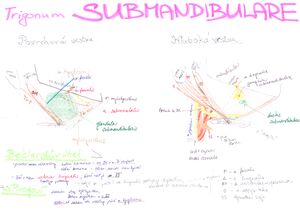Submandibular triangle
From WikiLectures
Boundary[edit | edit source]
- Cranially: the lower edge of the body of the mandible;
- Medially: anterior belly of digastric muscle;
- Laterally: posterior belly of digastric muscle;
- Bottom: mylohyoideus muscle, hyoglossus muscle, styloglossus muscle.
- Angular tract – a fibrous band separating the parotid and submandibular areas, part of the cervical fascia.
Contents[edit | edit source]
- Submandibular gland – externally touches both bellies of the digastric muscle, runs medially over the back edge of the mylohyoid muscle into the sublingual space;
- Submandibular duct – emerges from the gland towards the front and slides between the mylohyoid and hyoglossus muscles;
- v. facialis – along the outer surface of the gland;
- a. facialis - from the carotid triangle inwards from the digastric and stylohyoid muscles - medially from the gland, above the upper edge of the gland, it turns over the mandible and joins the vein;
- Lingual nerve and submandibular ganglion – runs through the upper part of the triangle, inwards from the edge of the mandible, bends forward in an arc and after crossing with the submandibular duct enters the sublingual region and the tongue, the parasympathetic submandibular ganglion is suspended in the arch;
- n. hypoglossus - comes to the lower part of the space from the carotid triangle inwards from the posterior belly of the digastric muscle- bent in the arc of the hypoglossal nerve , goes forward to the sublingual region through the slit between the mylohyoid and hyoglossus muscles;
- a. lingualis – at the base of the triangle of Pirogov, inwards from the hyoglossus muscle – it is ligated here;
- n. mylohyoideus – separates from n. alveolaris inferior before it enters the mandibular foramen and converges along the inner surface of the ramus of the mandible to the upper part of the submandibular triangle, located inside the gland, enters the anterior belly of the digastric muscle;
- Submandibular lymph nodes - distributed under the edge of the lower jaw and around the submandibular gland, collectors from the superficial and deep layers of all facial regions.
Triangle of Pirogov (containing the lingual artery)[edit | edit source]
- Cranially: hypoglossal nerve;
- Ventrally: posterior edge of the mylohyoid muscle;
- Caudally: posterior belly of the digastric muscle;
- Bottom: hyoglossus muscle
Links[edit | edit source]
Related Articles[edit | edit source]
External links[edit | edit source]
- HORKÝ, Drahomír – NOVÁKOVÁ, Květoslava. Morfologie orofaciálního systému pro studenty zubního lékařství [online] . 2. edition. 2011. Available from <http://mefanet.upol.cz/clanky.php?aid=58>. ISBN 978-80-244-2702-7.
References[edit | edit source]
- GRIM, Miloš – DRUGA, Rastislav, et al. Základy anatomie, 5.Anatomie krajin těla. 1. edition. Galén, 2002. 119 pp. ISBN 978-80-7262-179-8.



